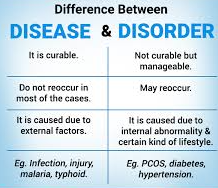Difference between Disorder and disease


The Differences between Disorder and Disease are given here. They are used with some frequency as synonyms, but they are two terms that identify two different types of conditions in humans. A disorder is a concept that defines an alteration in the state of health of a person while the disease has a known origin.
keep reading…
What is Disorder?
This term comes from Latin, from the sum of two words: Trans which means “to the other side” and torn are which means “turn or turn”. A disorder is a description of symptoms, behaviors, and actions of a person and that may be associated with pathologies and disorders. It can be especially related to mental pathologies, cognitive or developmental disorders. It has many uses, but in most cases, it refers to a mildly altered state of health. It is the action and effect of upsetting or reversing the order or regular behavior of something.
The term comes from the Latin infirmities and means “lack of firmness” According to the WHO a disease is the alteration of the physiological state in one or more parts of the body caused by known causes and manifested by characteristic symptoms and whose evolution is to a greater or lesser extent, foreseeable. The disease is also understood to be the loss of health and whose negative effect is the structural or functional alteration of an organ or system at any level. The concept of disease is only an approximation that guides the type of health problem, facilitating its understanding.
suggested video:
Disorder vs Disease
Difference between Disorder and Disease in points
- The disease is the loss of health, of bodily and mental well-being. It is considered the alteration of the normal state of the health of an individual. A disease is an abnormal disorder of the body or mind that causes a disturbance of normal function.
- A disease must have a known cause, a diagnosis, a prognosis, and a treatment.
- A disorder is descriptive, it describes the symptoms and altered behaviors of an individual. For example, you may have a vision disorder and its cause may be a disease.
Related Post
Recent Posts
Is energy quantized in classical physics?
No, according to classical wave theory the emission of electromagnetic radiations from the surface is…
Types of laser
Basically, there are four types of laser which includes: Gas Lasers Solid State lasers Liquid…
Ultrasound frequency range
What is ultrasonics? The study and application of mechanical vibrations with frequencies beyond the limits…
Electromagnetic Energy: What are some examples of it?
Electromagnetic energy definition Electromagnetic energy is the amount of energy stored in a region of…
Fundamental units and Derived Units with Examples
The Main Difference between fundamental Units and Base units is that Units that Express base…
Newton’s First law of Motion Examples in Our Daily Life
Newton's first law of motion states that " A body continues its state of rest…